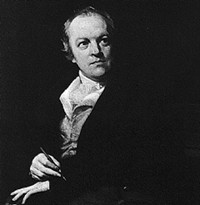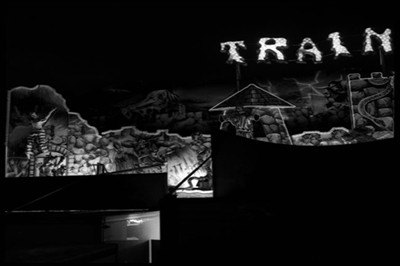 威廉·布萊克(William Blake),18世紀末19世紀初英國著名的畫家,英國文學史上最復雜、最有個性的詩人之一。布萊克的早期詩歌以頌揚愛情、向往歡樂與和諧為主題。他的詩歌語言質樸,形象鮮明,富有音樂感,充滿瑰麗的想象和奔放的熱情。后期詩作明顯具有神秘主義傾向和宗教色彩,用象征的手法來表達深邃的思想。布萊克生活清貧,靠繪畫和雕刻為生,他那富有個人靈念與想象力的恢弘詩篇生前并沒有得到承認。英國文學界直到19世紀末才開始意識到他們原來忽略的不僅僅是一位頗有造詣的版畫家,而且還是以為詩哲。在很多年以前,男孩們經常去打掃煙囪。他們得爬到煙囪里面。刮干凈煤煙,然后把它們掃走,這可是一項艱苦的工作,而且對身體非常有害。這首詩選自《天真之歌》,進一步表明“天真”是超越官能的感官束縛的關鍵,這樣就賦予天真以深刻的內涵。
威廉·布萊克(William Blake),18世紀末19世紀初英國著名的畫家,英國文學史上最復雜、最有個性的詩人之一。布萊克的早期詩歌以頌揚愛情、向往歡樂與和諧為主題。他的詩歌語言質樸,形象鮮明,富有音樂感,充滿瑰麗的想象和奔放的熱情。后期詩作明顯具有神秘主義傾向和宗教色彩,用象征的手法來表達深邃的思想。布萊克生活清貧,靠繪畫和雕刻為生,他那富有個人靈念與想象力的恢弘詩篇生前并沒有得到承認。英國文學界直到19世紀末才開始意識到他們原來忽略的不僅僅是一位頗有造詣的版畫家,而且還是以為詩哲。在很多年以前,男孩們經常去打掃煙囪。他們得爬到煙囪里面。刮干凈煤煙,然后把它們掃走,這可是一項艱苦的工作,而且對身體非常有害。這首詩選自《天真之歌》,進一步表明“天真”是超越官能的感官束縛的關鍵,這樣就賦予天真以深刻的內涵。
The Chimney Sweeper—William Blake
掃煙囪的小男孩——威廉·布萊克
When my mother died I was very young,
And my father sold me while yet my tongue
Could scarcely cry 'Weep! weep! weep! weep!'
So your chimneys I sweep, and in soot I sleep.
我母親死的時候,我還小,
我父親把我賣給了別人,
我當時還不大喊得清“掃呀,掃呀,”
就這樣白天掃你們的煙囪,晚上在煙灰里睡覺。
That curled like a lamb's back, was shaved; so I said,
'Hush, Tom! never mind it, for, when your head's bare,
You know that the soot cannot spoil your white hair.'
有個小湯姆,頭發卷得像羊毛,
剃光的時候,哭得好傷心,好難受,
我就說:“小湯姆,別哭,光了頭,
煙灰就不會糟蹋你的頭發了。”
As Tom was a-sleeping, he had such a sight!
That thousands of sweepers, Dick, Joe, Ned, and Jack,
Were all of them locked up in coffins of black.
他平靜了下來,當天夜里,
湯姆睡著了,夢見了這樣的情景,
迪克、喬、南德,杰克等千千萬萬個掃煙囪小孩
統統被鎖進了黑棺材。
And he opened the coffins, and set them all free;
Then down a green plain, leaping, laughing, they run
And wash in a river, and shine in the sun.
后來來了個天使,拿了把金鑰匙,
他打開棺材放出了孩子們(真是好天使!)
他們又跳又笑地來到了草地上,
洗浴于河水,晾曬于陽光。
They rise upon clouds, and sport in the wind,
And the angel told Tom, if he'd be a good boy,
He'd have God for his father, and never want joy.
把工具袋丟下,赤條條的,白白的,
他們升到云端,在風中嬉戲;
“只要你做個好孩子,”天使對湯姆說,
“上帝會做你的父親,永不缺少歡喜。”
And got with our bags and our brushes to work.
Though the morning was cold, Tom was happy and warm;
So, if all do their duty, they need not fear harm.
湯姆于是夢醒,我們在黑暗中起床,
拿起工具袋和刷子去干活。
晨風雖冷,湯姆自感心歡溫暖;
如果所有人都恪盡職守,就不怕災難。












